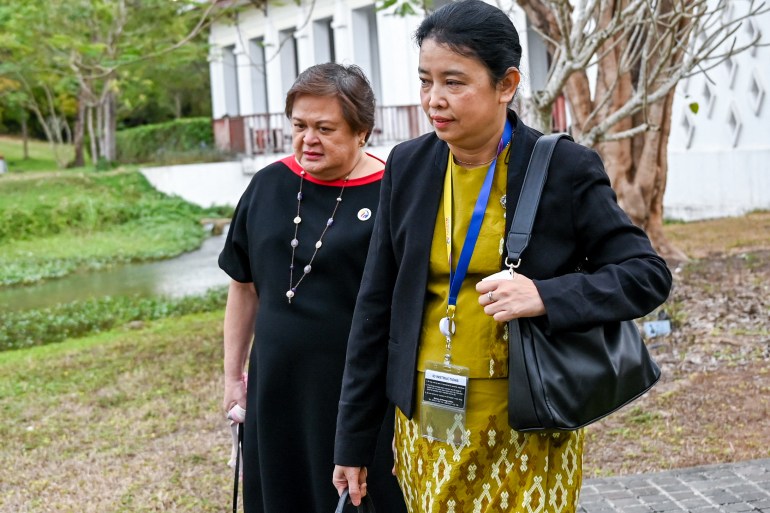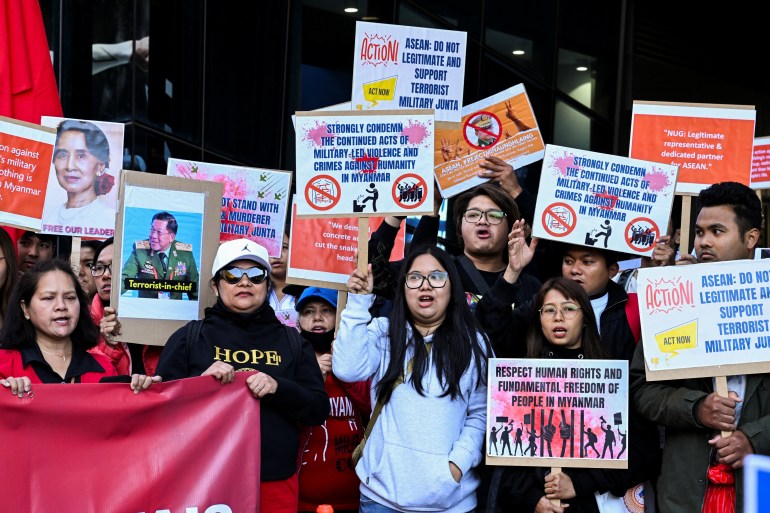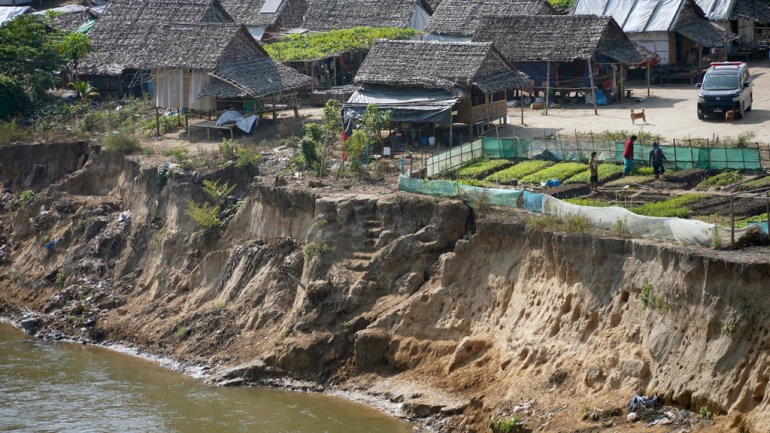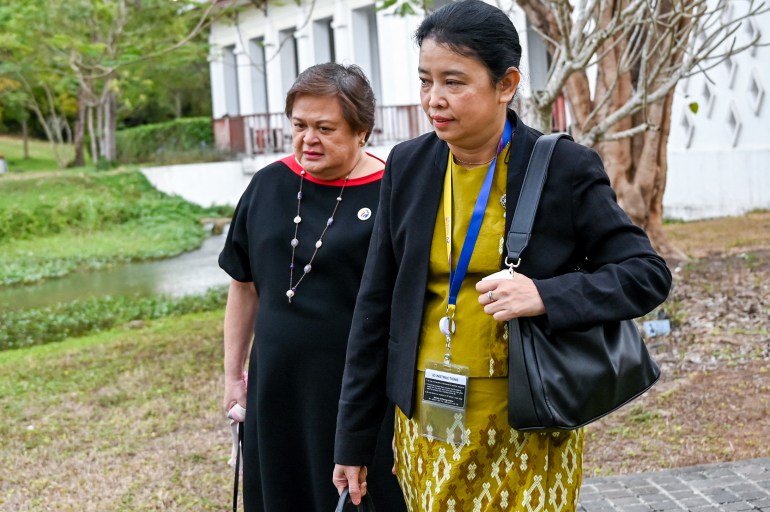Chiang Mai, Thailand – Thailand’s controversial humanitarian initiative with crisis-torn Myanmar is facing growing criticism even after its fellow members of the Association of Southeast Asian Nations (ASEAN) appeared to collectively endorse the scheme.
The ASEAN Foreign Ministers’ Retreat wrapped up recently in Luang Prabang, the old capital of landlocked Laos, with an emphasis on the stalled five-point consensus agreed between the bloc and the Myanmar military shortly after it seized power in a 2021 coup.
An official from Myanmar attended the meeting for the first time since the military regime was shut out of the top summits for failing to take steps to end the crisis.
Democracy activists and politicians have repeatedly called on ASEAN to take a more robust approach against Min Aung Hlaing and his generals, officially known as the State Administration Council (SAC). But with Laos now chairing the organisation, scepticism is growing.
After taking over the ASEAN chairmanship, Laos appointed a special envoy to Myanmar separate from its foreign minister, in a break from precedent. Career diplomat Alounkeo Kittikhoun visited Myanmar’s capital Naypyidaw in mid-January, meeting the generals and taking a page from Cambodia’s playbook of 2022 when it chaired the grouping.

Like Cambodia, and perhaps even more so, Laos is seen as close to China.
“ASEAN’s foreign ministers endorsed the much-criticised Thai humanitarian initiative and, given the growing role of China and other Myanmar neighbours since Operation 1027, ASEAN appears to be fading into the background,” said Laetitia van den Assum, a former Dutch ambassador to Myanmar, Thailand, Laos and Cambodia, referring to the offensive launched by ethnic armed groups and anti-coup forces late last year that took swathes of territory from the military.
She says Vientiane’s year-long stint as chair is likely to be “a hard slog”.
“For a country with a national debt of 125 percent of GDP [gross domestic product], and most of that debt owed to China, it may find it hard to find a way to make progress with some of ASEAN’s most pressing problems,” she told Al Jazeera.
Blatant disregard
Sasa, a cabinet minister with Myanmar’s National Unity Government (NUG), notes the group had failed to act even after the SAC’s atrocities over the past three years “blatantly disregarded ASEAN’s Five-Point Consensus”, which stipulates an end to the violence, undermining the bloc’s standing.
In addition, the generals have violated UN Security Council Resolution 2669, which also demanded an end to violence and the immediate release of President Win Myint and de facto leader Aung San Suu Kyi, Sasa told Al Jazeera.
The NUG is made up of politicians removed from office in the coup, as well as pro-democracy activists.
“ASEAN and its member states should engage with Myanmar’s legitimate democratic representatives, including the NUG and its allies. If so, ASEAN will help facilitate the restoration of peace, stability, and federal democratic governance in Myanmar,” the minister said.
There are concerns too about Thailand. It is one of the founding members of ASEAN, and its powerful military, which has itself carried out multiple coups, maintains close ties with the generals in Myanmar.
Thailand has indicated the humanitarian initiative was supposed to help pave the way for talks to end the crisis.
“Thailand wants to pull the SAC back into ASEAN and to make the junta presentable, and the humanitarian corridor proposed by Thailand is the first step of many,” van den Assum, the Dutch ambassador, said.
Thailand has sheltered about 90,000 refugees from Myanmar across nine refugee camps since the mid-1980s, Human Rights Watch said late last year. After the 2021 coup, at least 45,000 more Myanmar refugees fled to Thailand, the report estimated. Concerns are growing that Myanmar’s new conscription law, due to come into effect next month, could send even more people over the border.
Thailand and Cambodia “want to see Myanmar back fully in the ASEAN family”, Thai Prime Minister Srettha Thavisin said last month, a position he said was shared by visiting Cambodian Prime Minister Hun Manet.
Even before Laos took over the chairmanship of ASEAN from Indonesia, there were questions over the organisation’s ability to address Myanmar’s deepening crisis. The controversies and inactions – not only over Myanmar but also issues such as the South China Sea – have raised further questions about ASEAN’s relevance and its relationship with China, which is vying for influence with the United States.
China, which claims almost the entire South China Sea, held military drills there last month as the US and the Philippines conducted their own joint exercises in the same waters. Brunei, Malaysia, the Philippines and Vietnam – all ASEAN members – are also claimants to parts of the sea, as is Taiwan.
Beijing has been involved in a number of confrontations with Manila at the disputed Second Thomas Shoal and Scarborough Reef over the past year but has refused to back down. ASEAN has also been unable to make progress on a binding code of conduct with China – first discussed in 2002 – in the waters, adding to the perception that China expects Southeast Asia to bow to its demands.
ASEAN’s inertia suggests members are likely to pursue their own foreign policy on the divisive issue, with the Philippines and Vietnam last month signing agreements to broaden cooperation between their coast guards in the South China Sea.

The new Thai government’s approach to Myanmar, especially its recognition of the SAC, has drawn public criticism, notably from Kasit Piromya, a well-respected veteran ambassador and Thailand’s former foreign minister.
“Refusing to acknowledge that the junta is the sole reason for this destruction of democracy, society, and millions of lives is damaging to the government’s credibility on its own,” Kasit warned in an opinion piece published in the Bangkok Post. “When taken in conjunction with empowering his counterpart and the junta in general, however, Khun Parnpree is inherently signing off on the junta’s actions,” the veteran diplomat said, referring to Thai Foreign Minister Parnpree Bahiddha-nukara.
Van den Assum says many civil society and humanitarian groups have formally rejected Thailand’s proposal and say it is unlikely to generate the funding needed.
“Under this arrangement, Myanmar’s Red Cross Society gets its instructions from the SAC. We have seen what the SAC has done with other humanitarian operations. For example, after Typhoon Mocha in May, the SAC blocked humanitarian relief to Arakan for months,” she warned, referring to western Rakhine state.
Deepening crisis
Even as Thailand was cosying up to the Myanmar generals, new evidence was emerging of the scale of the SAC’s’ continuing violence and atrocities.
Myanmar news outlet Myanmar Now reported that some of the resistance in the country’s central Sagaing region had been burned alive by the military. Based on the accounts of residents and resistance fighters who were there, Myanmar Now identified six out of the eight victims, whose ages ranged between 30 and 60.
In a particularly gruesome execution, two resistance fighters in their 20s were hanged and burned in public in Magway Region, according to local news reports. The incident happened last year, but the video surfaced only recently.
“It’s imperative for ASEAN leaders led by Laos to push back against the barbaric actions of the Burmese junta. The Five-Point Consensus has proven ineffective, and it is time to abandon it. The junta must be held accountable,” Thinzar Shunlei Yi, a Myanmar human rights activist, told Al Jazeera.
But despite the deepening crisis, experts say that is unlikely to happen, noting that ASEAN’s response has been hobbled by the split between those – such as Laos, Cambodia and Thailand – who are more accommodating of the generals, and those who would prefer the organisation to be tougher. Myanmar has been a member of ASEAN since 1997.
Scot Marciel, the former US ambassador to Indonesia, ASEAN and Myanmar and author of Imperfect Partners: The United States and Southeast Asia, believes Western nations could perhaps “work more actively with a few individual ASEAN member states such as Indonesia and Singapore toward a better approach”.
Marking the coup’s third anniversary in February, Min Aung Hlaing extended the state of emergency that underpins military rule for a further six months.

The SAC has faced severe losses since Operation 1027 began, and a China-brokered ceasefire in the northeast looks shaky.
The Assistance Association for Political Prisoners (AAPP), a monitoring group, has documented the deaths of more than 3,000 civilians by the SAC and its allies, with more than 26,000 arrested since the 2021 coup, although the actual death toll is widely believed to be much higher.
“Thailand and Laos are actively endeavouring to re-engage the Myanmar junta, but their belief that addressing humanitarian crises will pave the way for political dialogue is misguided,” a senior pro-democracy politician from Myanmar, who declined to be named for fear of physical danger, told Al Jazeera.
“The crux of the Myanmar quagmire lies in the junta’s disregard for democracy and human rights, compounded by ASEAN’s inability to forge a cohesive response. Without concerted efforts to address these fundamental issues, any attempts to bring the junta back into the fold will ultimately prove futile.”
Read More: World News | Entertainment News | Celeb News
Aljazera










